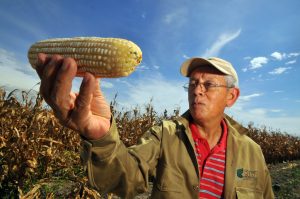
Image source
Our apathy, our lack of passion, is what might do us in in the end. We’ve become so acclimatized to what we are exposed to in our lives. Growing up in the Midwest, we become apathetic to farm animals. After all, do they not exist for anything but our needs? Spending a decade in California gets one very used to drought and even more extremely passive to potential catastrophe each year. Instead of questioning the nuance of why we are in our ongoing predicament, we blame climate change (as an easy catch all) or our neighbours that have just too green of a lawn.
It becomes much harder to question and pick out fellow hard working citizens in our tradition of farming and where our resources begin. For instance, California produces between ⅓-½ of the US grown fruits, vegetables and nuts. (Barron.) When considering the very arid climate that California has now become synonymous with, it can be mind boggling that we depend on such a tempermental area to produce a large bulk of our food. Yes, there are political and infrastructure issues. However, I am concerned with the farmers that have invested millions in their crops and machinery. Whilst another crop may be more effective, how much of a risk would any of us realistically take or ask of an individual farmer? Can we ask them to take the leap without the safety net such as the BMP Challenge that provides farmers the room to take chances? The risk of taking on new crops California did not evolve setup for irrigation alone- the flawed thought process that “massive engineering projects were the solution to any problem.” (Geiling)
So what is the correct path? What we find right and wrong in the privileged, modern world is unlike the choices and moral high ground that we can ask of developing countries. (Brausch) Yes, beef requires around 1800-1850 gallons of water to produce each pound (Broher) but where is it most needed? Luxuries such as olive oil (1700 gallons per pound of product) (Broher) and chocolate (2061 gallons per pound of product) (Broher) are demonized as quickly as almonds, but is it is as easy as to say “don’t consume it?” What if there were a way to more fairly compensate farmers in compatible climates to mitigate both the wages and wastage we incur in growing the crops? Once again, political and societal change is needed to facilitate the evolution we would need in order to strike a balance.
Sources cited and researched-
Barron, J. https://www.livestrong.com/article/1012421-foods-water-produce/
Brausch, “Meat Eating Could Save the Planet” https://www.theguardian.com/environment/2015/dec/23/meat-eating-could-save-the-planet
Broher, K.
https://www.huffingtonpost.com/2014/10/13/food-water-footprint_n_5952862.html
